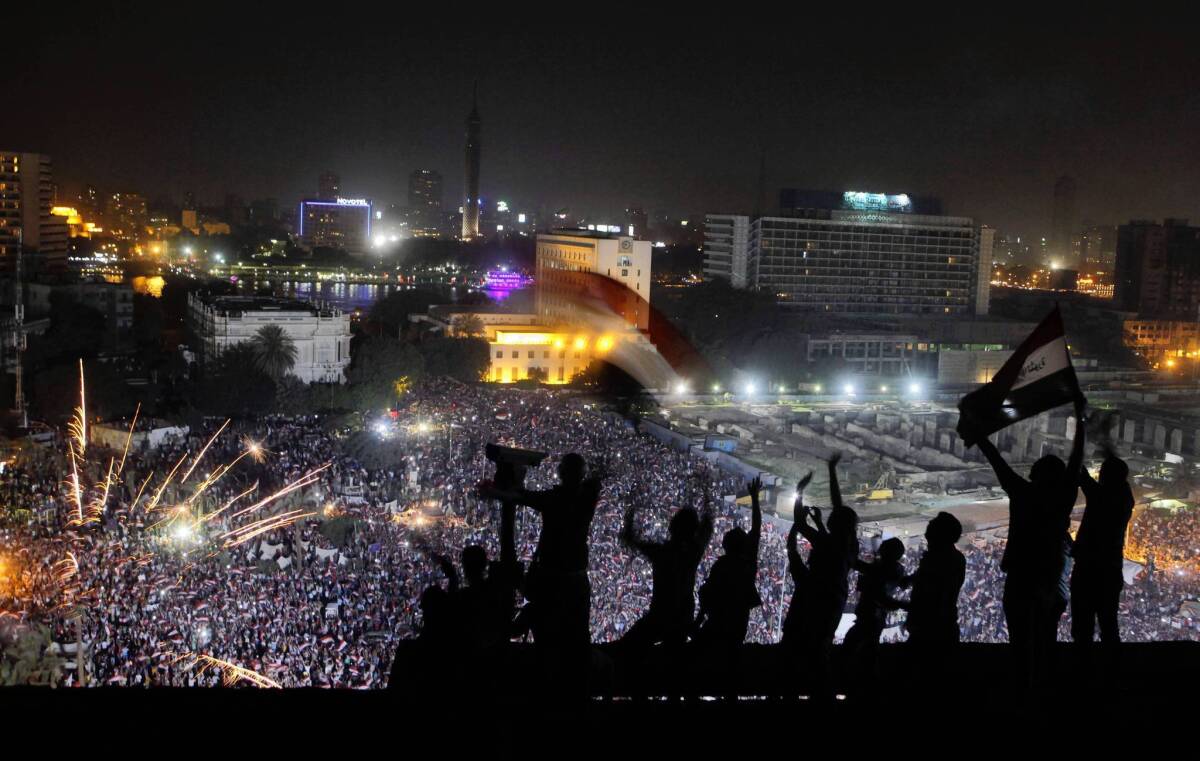Letters: Egypt and democracy

- Share via
It is unfortunate that the Egyptian people found it necessary to depose their new democratically elected government. However, the transition need not result in a denial of democracy.
As stated in the Declaration of Independence, “Whenever any form of government becomes destructive of these ends, it is the right of the people to alter or to abolish it, and to institute new government, laying its foundation on such principles and organizing its powers in such form, as to them shall seem most likely to effect their safety and happiness.”
A rapid transition back to a more responsive elected government could provide the Egyptian people with a better opportunity to achieve the goals enshrined in our Declaration of Independence.
Darrel Miller
Santa Monica
The people of Egypt didn’t lose faith in democracy; they didn’t care about democracy, or they didn’t get the concept.
They elected Mohamed Morsi. Even if they didn’t like him, the next election would have given them an opportunity to vote him out of office. That’s democracy. Instead, they protested in the streets. The coup was an opportunity the military could not pass up.
The lesson should be that elections matter, and the Egyptians should have thought more carefully about whom they were electing.
Stephany Yablow
North Hollywood
Opponents have many complaints about Morsi, but one is that while campaigning, he promised to share power, but once in office, he failed to do so.
Maybe Egypt has something to teach the world: If you make a campaign promise that is important, easy to keep and easy to verify, and then you fail to keep it, you will be forcibly removed from office.
Imagine that: taking campaign promises seriously, with an enforcer to hold politicians to their word.
Rodney Hoffman
Montecito Heights
Morsi seemed to have misunderstood the historic significance of his election last year. He was not chosen by the people to govern according to what the Muslim Brotherhood wants but rather to promote progress in education, the economy and the justice system and to seek tolerance for diversity in Egyptian social life.
It seems that because of his hubris and failure to see the harm he was doing to his country, Morsi’s days were numbered.
Paul L. Hovsepian
Sierra Made
Israel, far from being Egypt’s nemesis, can serve as its salvation. It was at once amusing and painful to see Muslim Brotherhood supporters scapegoating Israel by blaming the influence of U.S. aid to Egypt, with support for Israel as one motivating factor, for this week’s military coup.
Yet Israel’s example of how to reconcile political Judaism and democracy points the way for Egypt to honor the Muslim Brotherhood’s yearning for political Islam while protecting and empowering minorities.
As rough and tumble as Israeli democracy is, it works.
Roger Schwarz
Los Angeles
We must stop fetishizing elections. Yes, Morsi was elected (by a narrow margin); so was Hitler in 1933.
But once elected, Morsi ruled as a dictator, ignoring the opposition. Even many Muslims in Egypt understand now that Morsi simply couldn’t rule. Hence, the second revolution — this time, let us hope, one that will produce a truly democratic government.
To call this a step back is to ignore the dire situation in Egypt. How long were the Egyptian people supposed to wait?
Marjorie Perloff
Pacific Palisades
ALSO:
Letters: Making Earth inhospitable
Letters: Freer markets, cheaper rides
Mailbag: Angelenos on Mayor Garcetti
More to Read
A cure for the common opinion
Get thought-provoking perspectives with our weekly newsletter.
You may occasionally receive promotional content from the Los Angeles Times.









